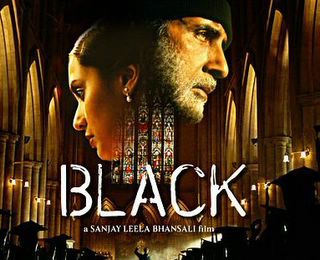Black

Sanjay Leela Bhansali is a strange bird. He has made a number of Hindi blockbusters (Hum Dil De Chuke Sanam, Devdas) which are more than a cut above the standard fare coming out of Bollywood. His films are distinguishable by their staggering budgets, their amazing sense of colour and production design and by -well- the sheer orientalness of it all. Costume, ritual, motif and a deeply embedded aesthetic ensure that the millions of rupees spent on an SLB film are worth every paisa of it all. His other forte lies in extracting perhaps the best possible performances possible from his leading ladies including the likes of Madhuri Dixit, Kiran Kher and even the remarkably wooden Aishwariya Rai. He has had less luck with his men. Getting Shahrukh Khan to emote in Devdas could have been no mean feat. Likewise getting a performance out of Salman Khan must have been akin to getting a sirloin steak to dance on one's plate.
And then Bhanasali goes and breaks all the rules he has spent so long making. He makes Black. This has got to be one of the strangest and yet most involving Hindi films I've seen in a long time. First the basics: Like its Hollywood predecessor, The Miracle Worker, Black follows the tale of a blind young girl,Michelle Mcnally,(Rani Mukherjee) from childhood onward. The focus of the story is the relationship that develops between Michelle and her alcoholic, down-at-the-heels teacher, Debraj Sahai (Amitabh Bachhan) over a period spanning decades. Yes, a blind protagonist is screaming for tear jerking melodrama and Black does not disappoint on that score. It does, however, have a number of reality induced redeeming features. The sexual tension between pupil and teacher for one. The lack of soppy sentimentality when Michelle flunks her exams four years in a row. ("You are a failure.") The slap across the face when she refuses to respond satisfactorily. And the avoidance of that ghastly euphemism- "special people."
So what sets Black apart? The number of anomalies it raises for one. Bhansali abandons the path he cut out for himself in previous films. Gone are the riotous colours. Black is shot entirely in hues of blue. Gone also is the orientalness (orientality?) of previous films. Although Black is set in India (Anglo India to be precise) the characters are garbed in "European" dress throughout. Not a single sari, dhoti or shalwar crosses the screen. Nor are there any dabkas, zardozis, paisleys or jamawars. Everyone wears sensible plaids and checks. The mood is European although the faces are brown or, at best, cafe au lait. One possible reason for the occidentalisation of Black could lie in not having to deal with generally retrograde South Asian values to blindness and, more generally, physical disability. Somehow, the tolerance levels towards blindness weave in more smoothly with the western ambience in which Bhansali sets his film. The sad fact of life is that physical disability is something with which the South Asian mind has yet to grapple and come to terms with. How many of us have friends who are blind or disabled? Or how many such people are we likely to come across in everyday life. Very few, I hazard to guess.
Finally, there's the grand Mr Bachhan. To apply a quotation, he didn't get any bigger- it's just the films that got smaller. Having achieved every success conceivable in Bollywood, AB has proven to be an anomaly at best and a liability at worst in several recent films. With his jet black hair and snow white goatee, he has been doomed to play Kareena Kapoor's father or some surreal underworld don in a string of mediocre or outright bad productions. In Black, he finally encounters the kind of role he should be playing. Does he succeed ? Well, he's certainly less irritating than he's been in most other films even though he adopts an English accent from hell. He is entirely credible, however, and that credibility sets Black apart from most films coming out of Bollywood. Oh yes. There are no songs at all. Not even in the background. And unlike most Bollywood productions, Black clocks in at around just under two hours of playing time.If that aint trailblazing, I have no idea what is.

2 Comments:
Good review - i loved the film. There was only one scene that struck me as extremely 'hindi movie style' (the graduation speech) but the rest was very, very, very good.
and i agree with your opinion on Mr. Bachhan.
and you know what? i HATE to admit this but i like salman khan. i think he has had his funny moments. plus he's hot. i guess my school girl crush on him never went away!
S: Yeah. The graduation scene sucked, but it was the grand moment when everything comes together a la bollywood. As for Salman, he showed promise in the early films, but the gratuitous display of nipples got to me :)
TDH: Nope. Never written for Dawn. Never been to Nepal in my life.
Post a Comment
<< Home